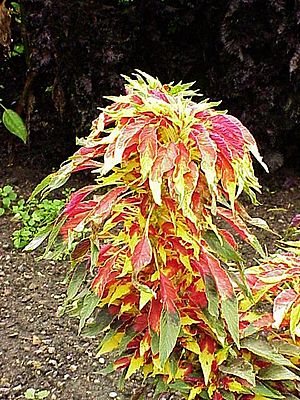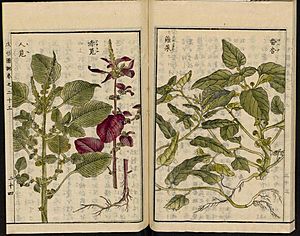Amaranthus tricolor facts for kids
Quick facts for kids Amaranthus tricolor |
|
|---|---|
 |
|
| Scientific classification |
|
| Kingdom: | Plantae |
| Clade: | Tracheophytes |
| Clade: | Angiosperms |
| Clade: | Eudicots |
| Order: | Caryophyllales |
| Family: | Amaranthaceae |
| Genus: | Amaranthus |
| Species: |
A. tricolor
|
| Binomial name | |
| Amaranthus tricolor |
|
| Script error: The function "autoWithCaption" does not exist. | |
| Synonyms | |
|
List
|
|
Script error: No such module "Check for conflicting parameters".
Amaranthus tricolor, also called edible amaranth, is a type of flowering plant. It belongs to the Amaranthus group, which is part of the Amaranthaceae plant family.
People often grow this plant for two main reasons. First, it is grown as an ornamental plant because its leaves have bright, striking colors. Second, it is grown for cooking. It has many different names around the world. In Korea, it is called bireum. In India, it is known as tampala or tandalja bhaji. In the Caribbean, it is called callaloo. In other places, it is known as Joseph's coat. This name comes from the biblical story of Joseph, who wore a coat with many colors.
This plant originally comes from South and South-East Asia. However, A. tricolor is now grown in warm areas all over the world. Different types of this plant can have amazing yellow, red, and green leaves.
Contents
What is Amaranthus gangeticus?
Amaranthus gangeticus is a name that used to be for a separate plant. Now, scientists usually consider it to be the same species as A. tricolor. It is also known as elephant-head amaranth.
This plant is an annual flowering plant, meaning it lives for only one growing season. It has beautiful deep purple flowers. It can grow to be about 2 to 3 feet (60 to 90 cm) tall. In Bangladesh, people have used its leaves as a vegetable.
How is it used in cooking?
The leaves and stems of edible amaranth can be eaten raw in a salad. In Africa, people usually cook it as a leafy vegetable. In China and Japan, it is often stir-fried or steamed. It is served as a side dish with meals.
In China
In China, this plant is called xiàncài (simplified Chinese: 苋菜; traditional Chinese: 莧菜). It is often cooked by stir-frying it with garlic and a little salt.
In Korea
In Korea, the plant is known as bireum (비름). A type called chambireum (참비름) has small leaves and reddish stems. This type is used to make a vegetable dish called namul in Korean cuisine.
Chambireum is often found growing wild in the countryside. People usually gather it rather than planting it on farms. It has an earthy and nutty taste. It tastes great with different Korean sauces, like gochujang (a spicy paste) or soup soy sauce. It also goes well with bori-bap (barley rice).
-
Bireum-namul (seasoned edible amaranth)
In culture
The Amaranthus tricolor plant appears on the coat of arms of Gonville and Caius College, Cambridge. On the coat of arms, it is called "flowers gentle."
See also
 In Spanish: Ala de loro para niños
In Spanish: Ala de loro para niños
 | Jessica Watkins |
 | Robert Henry Lawrence Jr. |
 | Mae Jemison |
 | Sian Proctor |
 | Guion Bluford |




